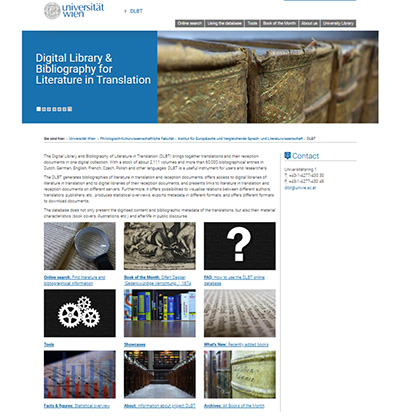DLBT - Digital Library and Bibliography
for Literature in Translation and Adaption
With the DLBT, the Vienna University Library provides a database and research infrastructure that supports researchers interested in the topic of literature in translation in recording translations and reception documents beyond borders of national literatures together with other users and in giving easy access to digitised materials on translations and their reception.
The DLBT is geared towards the requirements and needs of translation-related research from various disciplines.
Users can not only collect digitised content and bibliographic metadata of translations in the DLBT, but also information about material characteristics of editions (covers, illustrations, etc.) as well as reception documents that record the impact of the texts on public discourse. Users can also record adaptations in other media (film, theatre) in the DLBT and make them accessible via the digital library.
Decentrally edited project
The DLBT is edited decentrally by the staff and editors of the participating projects.
Each project has its own editorial team which is responsible for entering data and digitising texts and documents. The respective project manager decides independently in which form, where and when their data are made available.
The DLBT is constantly growing thanks to the work of individual researchers. Each project covers its own bibliographies and libraries specific to the topic, literature or language. These projects contribute to the DLTB independently.
Although all research data and digitised material are managed, edited, exported and presented on a project-specific basis, they are linked in the background. Through these links, the DLBT is more than the sum of all individual projects and has the potential to become a comprehensive database spanning time and space and thus an indispensable resource for future translation-related research. If many projects participate, the DLBT could become the gateway to a comprehensive literature for translation and its reception.
The metadata and digital assets collected in the DLBT can be presented by the project partners on their own websites. One of the largest projects and best practice example realised with the DLTB and on the basis of the DLBT is Dutch Literature in Translation (DLIT).
Functions of the DLBT
- Inserting/editing data, files, identification codes, links
- Defining links between texts
- Use of VIAF, ISNI, wiki data
- Importing of and exporting to different formats
- Checking for duplicates when importing
- Downloading texts in different formats
- Personal bookshelf
- Simple search, advanced search and full text search
- Different forms of presentation
- Visualisations (statistics, maps, display of relationships)
- DH tools for analysing and comparing texts
- API (export, presentation and visualisation of data on own website)
Open access and sustainability
The digital copies in the DLBT are stored in PHAIDRA. Thus, they are permanently stored and, like the DLBT metadata, openly accessible (CC BY 4.0).
Interested?
We cordially invite researchers who are interested in translations and their reception or their history to participate in the project. The DLBT is suitable for projects of different scope, from doctoral theses to large-scale international research projects.
If you would like to create a new bibliography or library, enter existing data, or simply share data, please contact the DLBT team dlbt@univie.ac.at

